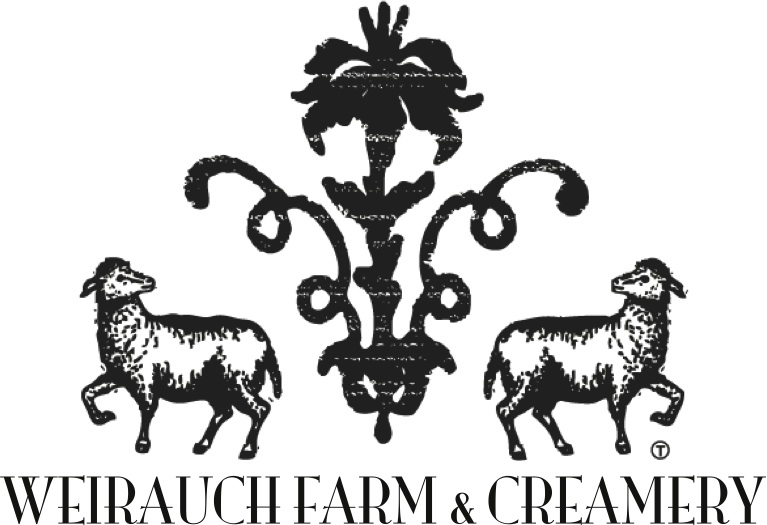The Dynamic Duo: An Interview with Weirauch Creamery
 The Weirauchs are a new creamery on the California block, relatively speaking, but they are one of the most treasured. Joel and Carleen Weirauch are some of the happiest people in the industry, and the smiles on their faces are catching. It's no wonder. If I made sheep's milk cheese like their Saint Rose, which tastes like a harmonic dairy convergence between Berkswell and a mountainous Basque tomme, I'd be beaming too. And their cow's milk cheeses that they craft when their milking ewes are resting for the season? Just as beam-worthy. I'm very happy to share an interview in my The Daily Rind series on "It's Not You, It's Brie." Thank you, Joel Weirauch for your time (and thanks, Jesse for your series name suggestion)!
The Weirauchs are a new creamery on the California block, relatively speaking, but they are one of the most treasured. Joel and Carleen Weirauch are some of the happiest people in the industry, and the smiles on their faces are catching. It's no wonder. If I made sheep's milk cheese like their Saint Rose, which tastes like a harmonic dairy convergence between Berkswell and a mountainous Basque tomme, I'd be beaming too. And their cow's milk cheeses that they craft when their milking ewes are resting for the season? Just as beam-worthy. I'm very happy to share an interview in my The Daily Rind series on "It's Not You, It's Brie." Thank you, Joel Weirauch for your time (and thanks, Jesse for your series name suggestion)!
You and your wife are very personable, happy people. I always hear cheesemongers talk about how much of a pleasure it is to work with you, and at a recent cheese festival, my father spent half an hour talking to you alone (granted, he does like to talk, and you had samples to feed him, but that’s still a long time). After such long days working on the farm, making cheese, and cleaning –as we’ve learned from Bohemian Creamery’s Lisa Gottriech (from previous post) is sometimes even the biggest part of a cheesemaker’s day, what keeps the smiles on your faces?
Yes, our days are long and there are many times when I am ready to eat and relax but I have to head back up the hill to finish the evening chores - feeding and watering the sheep. Almost everytime during feeding, once the sheep have been fed and the commotion around the feeders slows down, one of the ewes will demand a little extra attention. It is in these moments, where I am forced to slow down, that I find some contentment.
What does an average day look like for you two at Weirauch Creamery?
Our work schedules change with the seasons. Late winter brings the lambs and all the attention to caring for moms and newbies. We then move into the milking time, where twice a day the sheep are milked and the cheesemaking days ramp up. Right now we are breeding the sheep, it is a slower time of the year, however there still plenty of work in the cheese aging room, cheese sales and farm markets. There is never a day off, but this time of year we can have dinner with friends. There are constant interruptions that we never plan on but have to deal with. We have lost power to the creamery during cheesemaking, we had a cooling unit go down during milking, we had a large shade canopy (caught up in a wind storm) rip through the electric fencing and crumple in a heap the other night . There are so many examples that I'd almost say we don't really have average days.
Families traditionally work together at creameries, but things are changing and it’s not always the case that all members of a family or couple want to be involved in such a business. What lead to the decision for you and your wife to work together, and did the division of labor come about naturally?
Carleen and I chose to work together as a way of life. We want to have a shared lifestyle where our work and life are intertwined. The realities of farming don't always allow for this. Carleen holds a part time job off the farm, while working full time on the farm. I am full time farm worker and cheesemaker. We share the duties as much as possible, but often times the duties fall to the person not engaged in some task or another.
Why did you decide on sheep rather than cows or goats (or buffalos), and what was the most surprising things you learned from raising them, and making cheese with their milk?
Sheep milk is amazing, it wants to make cheese on its own. The curd sets up firm and the yields are high. I became interested in sheep milk cheeses after traveling through Europe and realizing that the US has very few sheep dairies. The sheep dairy industry in the US is relatively young. I feel connected to the other sheep milk producers and I enjoy the collaboration and sharing of knowledge between the producers.
If you had all the space, time, labor, and money available to you, what cheese(s) or cheese styles would you try making? Would you make them in California?
What I really want is a cave to age cheeses in, maybe two or three caves. Real caves with natural cooling and humidity. I would like to see what a cave would do to a gooey semi-soft wheel.
What’s your favorite pairings for your fresh cheeses?
Our fresh sheep cheese, Primo Fresco, pairs well with both sweet and savory. I love it in salads and it makes an amazing cheesecake (albeit expensive).





